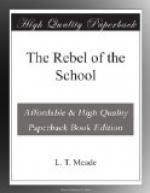“You are Alice Tennant?”
“Yes, madam.”
“You are in the upper fifth?”
“Yes,” said Alice again.
“I have had very good reports of you from Miss Purcell and Miss Dove and others; you will probably be in the sixth next year.”
“I hope so; it will be a very great delight to me.”
Alice trembled and colored, looked down, and then looked up again. Miss Ravenscroft was regarding her with kindly eyes. Hers was a sort of veiled face; she seldom gave way to her feelings. Part of her power lay in her potential attitudes, in the possibilities which she seldom, except on very rare occasions, exhibited to their fullest extent. Alice felt that she had only approached the extreme edge of Miss Ravenscroft’s nature. Miss Ravenscroft was silent for a minute; then she said gently:
“And your friend, Kathleen O’Hara? I wrote to her also. Why isn’t she here?”
“I am very sorry indeed,” said Alice; “it isn’t my fault.”
“We won’t talk of faults, if you please, Alice Tennant. I asked you why your friend isn’t here.”
“I must explain. She isn’t my friend. She lives with mother—I mean she boards with mother.”
“Why isn’t she here?”
“She got your letter. I suppose she didn’t understand; she is so new to schools. She is not coming.”
“Not coming? But I commanded.”
“I know, I tried to explain, but she is new to school and—and spoilt.”
“She must be.”
Miss Ravenscroft was silent for a minute.
“We will defer the subject of Kathleen O’Hara until I have the pleasure of speaking to her,” she said then. “But now, as you are here, I should like to ask you a few questions.”
“Yes.”
“What you say, Alice Tennant, will not be—I speak in judicial phrase”—here Miss Ravenscroft gave vent to a faint smile—“used against you. I should like to have what information you can give me. There is a disturbing element in this school. Do you know anything about it?”
“Nothing absolutely.”
“But you agree with me that there is a disturbing element?”




